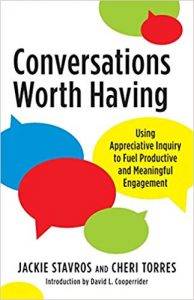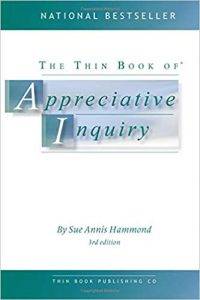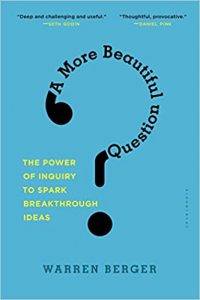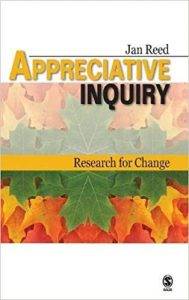The 20 Best Books on Appreciative Inquiry
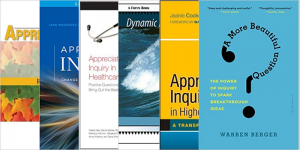 Appreciative inquiry is a strength-based approach addressing change and is considered a constructive alternative to traditional problem-solving approaches.
Appreciative inquiry is a strength-based approach addressing change and is considered a constructive alternative to traditional problem-solving approaches.
The intention in this process is to seek and leverage the best in people and place the focus more on what we want and less on what is broken.
Appreciative inquiry involves asking insightful questions in to heighten the positive potential of individuals and groups.
This methodology provides an opening for expanded creativity, imagination, and innovation, as opposed to the negative, critical focus of fixing something. The emphasis becomes on discovering, dreaming, and designing.
This article provides a summary of books written about this popular topic of Appreciative Inquiry. While this is not an exhaustive list, we have highlighted, summarized and reviewed 20 books and hope you find this resource to be helpful.
Before you continue, we thought you might like to download our three Strengths Exercises for free. These detailed, science-based exercises will help your clients realize their unique potential and create a life that feels energizing and authentic.
This Article Contains:
- Appreciative Inquiry: A Positive Revolution in Change
- Appreciative Inquiry Handbook: For Leaders of Change
- Appreciative Inquiry: Change at the Speed of Imagination
- Appreciative Inquiry for Change Management: Using AI to Facilitate Organizational Development
- Appreciative Inquiry in Health Care: Positive Questions to Bring Out the Best
- 15 More Recommended Reads on AI
- A Take-Home Message
- References
Appreciative Inquiry: A Positive Revolution in Change
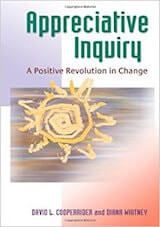
This book was written by Diana Whitney and David Cooperrider, the creators and leaders of the Appreciative Inquiry (AI) movement. It is a practical guide providing a constructive approach to organizational change, and they built the concept on the possibility of a better future.
The authors highlight the theory of collaborative change, focusing on coordinated actions and more connected relationships for those involved. Their position is that by moving away from the winner/loser model it will lead to more adaptive and impressive solutions.
This book represents an innovative method of change management and provides a clear introduction and foundation of the model. Examples, stories, applications, and benefits are highlighted throughout the book.
It is considered the most credible and popular guide to AI, describing how this method can tap human potential and help organizations, communities, and individuals become more effective.
The authors’ position AI as an invitation to the positive revolution in change. Organizations are more than their surface problems to be solved; rather, they are described as more dynamic, centers of “vital connections and life-giving potential” (relationships, interactions, partnerships, knowledge, alliances, partnerships, etc.).
The principles of AI support that collective strengths do more than perform, they transform. The position in this book is to move away from deficit-based change models to a life centric, dynamic approach. AI focuses on the human, interactive element of organizations foremost.
According to these pioneers, Appreciative Inquiry is, “the cooperative, co-evolutionary search for the best in people, their organizations, and the world around them. It involves the systematic discovery of what gives life to an organization or community when it is most effective and most capable in economic, ecological, and human terms” (Appreciative Inquiry, 8).
Many AI materials incorporate the 4-D Cycle created by Diana Whitney and Amanda Trosten-Bloom.
The Discovery, Dream, Design, Destiny phases are outlined here:
- Discovery
- “What gives life?”
- The best of what is
- Appreciating
- Dream
- “What might be?”
- What is the world calling for?
- Envisioning Results
- Design
- “What should be the ideal?”
- Co-constructing
- Destiny
- “How to empower, learn, and adjust?”
- Sustaining
Key concepts about AI that are emphasized include that it is:
- affirmative, focusing on possibilities and not problems
- inquiry-based, showing there is a search for learning and discovery and an openness to learn through question asking; and
- it is spontaneous, unique, and improvisational, each example deepening the varying circumstances.
Examples are provided in the book in terms of the step-by-step process, as well as the impact the process can have in specific settings. It describes how the AI process has helped build cross-sector collaboration, as well as contributing to positive societal change.
The message throughout supports that once people are given means and resources, and are empowered to ask relevant questions, positive change is inspired. AI creates opportunities for people to feel affirmed, validated, and valued.
You can find Appreciative Inquiry: A Positive Revolution in Change on Amazon.
Appreciative Inquiry Handbook: For Leaders of Change
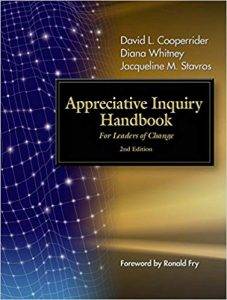
The Appreciative Inquiry Handbook was also written by thought leaders David Cooperrider and Diana Whitney. It provides the structure and information needed to launch an AI initiative, and includes background information on Appreciative Inquiry and how it works.
Practical tools such as sample project plans, designs, agendas, course outlines, interview guides, worksheets, and resources are provided in this utility book. This workbook format covers the introductory concepts for new learners, as well as tools for the application of AI.
Since we live in a time of unprecedented change, impacting all of our human systems (families, communities, government, organizations), the authors see the need for a paradigm shift. They recognize the need for updated ways of working with human systems in this new reality.
The authors explore how Appreciative Inquiry can be a perspective and a model applied to the practice of organizational change and transformation. Information and examples are provided in which the intentional, strengths-based model of AI can be applied to enable systems to function optimally with the interplay of interpersonal dynamics.
In the book, it is suggested that traditional methods that deal with whole systems need updating, considering the current rate of change and transformation experienced in organizations and cultures worldwide.
The AI model considers this rate of change, the complexity of human systems, and the unpredictability of human behavior. Authors note that the traditional OD models highlight deficits in the belief that the organization can return to a steady state.
AI provides a different take, pulling the focus away from the “deficit”. AI is presented not necessarily as a process or method, yet as a way of seeing and being in the world. According to the AI frame, we do not see problems and solutions as separate; yet, as a coherent whole, made up of our wishes for the future and the path towards what could be possible.
The authors suggest that OD professionals do not shift the tools of their practice (team building, strategic planning, organizational redesign), but shift their perspective on how they approach these processes.
The book explores essential elements of appreciative inquiry, starting with the theoretical construct. The authors describe the process of appreciative inquiry and practically how it works. Furthermore, the process is broken down into the 4D components: discovery, dream, design, and destiny phases. Application examples of the 4D cycle are provided in some detail.
The intention is to recognize the theoretical impact of the paradigm and construct that has been created and a how-to of bringing it to a practical, applicable level. It offers methods, tools, and insights to provide the reader/learner to find the positive strengths of organizations, and to apply that core of strengths to shaping businesses socially constructive.
An interesting insight noted is the idea that appreciative inquiry is really about the learning and understanding first, in order to then fully appreciate and value.
This handbook is described as a primer for “what to do,” “how to do it,” and “why to do it” when using AI methodology. The second edition of this book also provides additional examples and measured impacts, including evidence of positive change from longitudinal interventions.
Overall, this handbook provides the foundational concepts of AI, the latest concepts and cases, and necessary resources to apply appreciative inquiry methodology.
You can find the Appreciative Inquiry Handbook for Leaders of Change on Amazon.
Appreciative Inquiry: Change at the Speed of Imagination
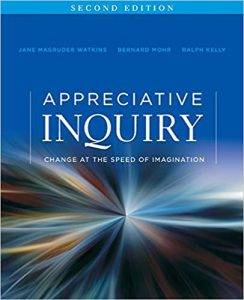
Written by Jane Magruder Watkins, Bernard J. Mohr, and Ralph Kelly, this book is a user-friendly resource for OD and HR professionals. It show how these professionals can tap into the power of the Appreciative Model process.
The authors recognize how AI is an effective strategy to work within an organization, as it is treated as an organic system. According to this paradigm, the success of this system depends on a holistic approach to connecting the organization’s technical, human, and organizational functions.
The intentions of the authors were to make the AI process accessible and practical for users. The book summarizes the theoretical basis of AI, explores the fundamental assumptions and beliefs, and lays out the general processes.
The book also provide pragmatic step-by-step guidelines on how to apply AI to a range of organizational situations such as initiatives, including coaching, leadership development, strategic planning, and team- building.
While the book includes the history, theory, and practice of AI, AI is introduced as a new paradigm to approach change. A helpful exploration of the five core processes for guiding AI based change is provided, with case examples to support the model.
A positive, strengths-based approach of inquiring identified stories is emphasized throughout the book. This is expanded into the inquiry into what gives life to the “system” organization wide. Methods for creating shared images are explored when identifying a vision for the future. The exploration of the valuation of AI methodology in organizations is also addressed.
What is helpful about this book is how the context of AI can be applied at all levels of systems, from individual to organizationally wide. The constructs can be applied to result in individual or scalable results.
The book describes relevant case studies exploring various proven and successful interventions. The stories presented provoke curiosity about how the reader could apply such ideas in their own lives or organization.
You can find Appreciative Inquiry: Change at the Speed of Imagination on Amazon.
Appreciative Inquiry for Change Management: Using AI to Facilitate Organizational Development
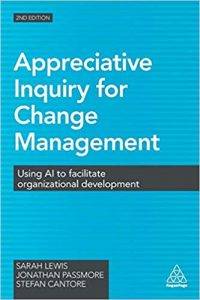
In this book, authors Sarah Lewis, Jonathan Passmore, and Stefan Cantore explore the power of conversation to create better futures for individuals and organizations. Appreciative inquiry highlights conversation as a key tool for organizational change. A key construct is that organizations are viewed as “living human systems.”
The conversational based practice highlighted in AI is outlined and described as to how it can be practically applied. Throughout the book, in-depth exploration is provided on skills that support integrated conversation practices, such as question creation, learning to be a conversational practitioner, and leveraging stories within an organization.
Ways to create momentary snapshots of clarity and using this awareness to help understand how to achieve change purposefully are highlighted.
In the later portions of the book, the skills, perspectives, and approaches are pulled together in a more applied format. A conversation-based approach is presented to address organizational challenges. Within this model, AI is featured as a prevalent approach in doing so.
The book is built upon the foundational model laid out in previously written pieces.
It reflects an integration of:
- conversational approaches to organizational change;
- a systematic and relational understanding of organizations;
- a social constructionist perspective on social life and the nature of knowledge;
- a psychological application of people’s behaviors;
- and a pragmatic approach to the application of knowledge and skill.
The intention of the authors was to provide an informed, easy-to-understand guide to what conversational practice is, what makes it work, and how to do it.
You can find Appreciative Inquiry for Change Management on Amazon.
Appreciative Inquiry in Health Care: Positive Questions to Bring Out the Best
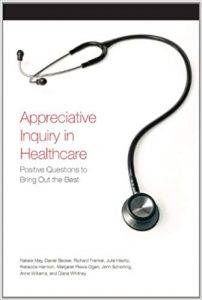
As a respected and credible AI contributor, Diana Whitney and colleagues wrote this book as a practical toolkit designed to stimulate positive change and engage others in creating the healthcare environment that authors believe is needed today.
The book includes Appreciative Inquiry questions and AI activities created specifically for health care settings: hospitals, clinics, educators, and health care leaders. It was created to be an encyclopedia of positive questions to help leaders in healthcare and their teams.
The bank of questions helps patients tap into past experiences where they have used their strengths, and apply that to their current stress. Engaging patients in this process often helps get them into a more resourceful state of mind to address immediate challenges.
An objective of the book is to harness the creative energy and passion of people at varying levels. The model can be integrated to support caregivers, patients, and families.
You can find Appreciative Inquiry in Health Care on Amazon.
15 More Recommended Reads on AI
The following is a long but good list of excellent books about Appreciative Inquiry.
 1. Conversations Worth Having: Using Appreciative Inquiry to Fuel Productive and Meaningful Engagement
1. Conversations Worth Having: Using Appreciative Inquiry to Fuel Productive and Meaningful Engagement
Authors – Jacqueline Stavros and Cheri Torres
Jacqueline Stavros and Cheri Torres are well versed in AI. In this book, they focus on the art of conversation and show how to use conversation to help people, organizations, and communities flourish.
The authors propose that people are tired of meaningless interactions and destructive conversations, longing for more meaningful engagement that builds connection, fuels productivity, and generates positive change.
They highlight the power of having positive conversations that are productive, promote meaningful change, and lead to creative possibilities. These conversations can inspire cooperative action that has a positive impact in people, communities, and organizations.
The position of the authors is that living into our potential begins with these conversations and Appreciative Inquiry is the foundation of the book. In it, the authors describe two simple AI practices and five principles to make most conversations worth having. What is described is how to engage people in a way that they want to take action.
Every chapter provides real-life examples, including applications from business, education, community, and family settings. Appreciative Inquiry research and evidence behind the AI model is shared throughout the text as well.
This book has been described as about the art of the “conversation worth having.” It has been considered the integration of strengths-based management, positive psychology, and design thinking.
Authors support the possibility that all conversations can begin in a positive frame and end in a more positive way. Conversations lie at the heart of who we are and how we interact, as we are constantly engaged in internal and external dialogue.
You can find Conversations Worth Having on Amazon.
2. Encyclopedia of Positive Questions Volume I: Using Appreciative Inquiry to Bring Out the Best in Your Organization
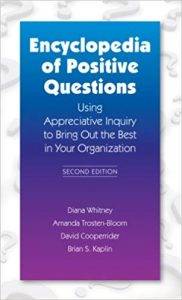
Grounded in Appreciative Inquiry, this handbook provides a resource of positive questions to identify and bring out the best in people and organizations. Written by numerous seasoned and experienced experts, questions highlighted are central to the “discovery” phase of the Appreciative Inquiry process.
Authors propose that these questions have implications for numerous elements of a business: customer focus groups, quality management, team building, performance appraisal, measurement systems, and surveys.
Their position is that the AI model is relevant in any process in which we ask questions or gather data. In the 2nd edition of this book, sample questions are organized into nine categories of positive organizational impact. The 2nd edition also includes fourteen complete interview guides, corresponding to each impact area.
You can purchase the Encyclopedia of Positive Questions 2nd Edition on Amazon.
3. The Thin Book of Appreciative Inquiry (Thin Book Series) 3rd Edition
Sue Annis Hammond has provided a third edition of the Thin Book of Appreciative Inquiry because of popular demand. This best-selling guide includes the latest research and examples of how to apply AI. Universal to AI resources, the focus is on what is working, not what is the problem.
This book provides a clear and concise introduction to the AI concept and offers practical information on its application. It is written generally, so varying audiences can benefit from it (coaches, individuals, managers, teachers, leaders, etc.).
This thin book is a quick read, offering general context and curiosity, which may spark further reading, research, and learning. It is user-friendly and an overview rather than highly comprehensive or detailed.
Hammond delivers concise, straightforward resources, and case examples to describe AI.
You can purchase the Thin Book of Appreciative Inquiry 3rd Edition on Amazon.
4. The Appreciative Inquiry Summit: A Practitioner’s Guide for Leading Large-Group Change – 1st Edition
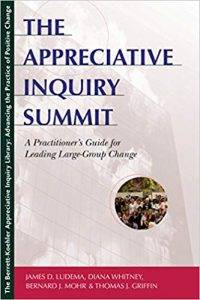
This book describes the methodology of an AI Summit program designed for large-scale application of Appreciative Inquiry. Authors offer the book to practitioners who want a clear guide to help design, facilitate, and execute the AI Summit model.
It can also provide a helpful context for leaders who are integrating the Summit model in their organizations. The Summit process should engage an organization in inquiry and dialogue to create a more desirable, better future.
The proposed format is designed for a venue in which people can come together, in conditions that foster positive exchange, safety, and enthusiasm to promote hope and spark action.
The summit model is described as a four-day process/event, bringing large groups of people together. It is built upon principles of AI and organizational change, and an overview of both is provided.
Authors walk you through how to prepare for a summit, planning, and designing, conducting the actual program, and approaches for implementing and supporting the changes identified during the program.
As supporting material, a sample participant workbook, worksheets, and practical tools are provided as well.
You can find The Appreciative Inquiry Summit on Amazon.
5. Appreciative Coaching: A Positive Process for Change
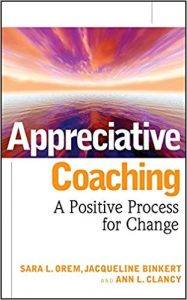
In “Appreciative Coaching: A Positive Process for Change,” Sara Orem and Jacqueline Binkert provide an approach to coaching that is grounded in Appreciative Inquiry. Appreciative Inquiry is the core of this coaching process to inspire change.
It discusses how coaches can guide their clients to tap into or rediscover their own sense of curiosity, wonder, and excitement about their lives and future possibilities. Authors propose how to help clients work through the four stages of AI (discovery, dream, design, and destiny).
The book should help inspire people to an appreciative and empowering way to view their lives. Throughout the book, authors weave together theory, stories, examples, suggestions, and tools for effectively incorporating AI principles into the coaching process.
Their intention was to nurture the process of change and discovery in a way that is self-affirming and non-judgmental for clients.
You can find Appreciative Coaching: A Positive Process for Change on Amazon.
6. Appreciative Team Building
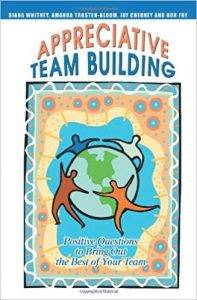
This book is a key resource for applying appreciative inquiry to team settings, especially as it relates to building high-performing teams.
It is not intended to be a traditional team building book. Rather, the purpose is to help readers foster a deeper understanding of why teams work when they do. In their presentation of ideas, the authors foster curiosity about alternative ways to help teams develop and grow. It provides methods for generating and facilitating engaging conversations.
Descriptions of ways to use positive questions, positive questions to bring out the best in your team, and how to apply a self-managed appreciative inquiry process are covered. This AI applied method is to facilitate conversations that will enable teams to discover keys to past successes and future possibilities.
The aim of the book is to assist readers in intentionally steering conversations as a way to generate more connectedness, cohesiveness, cooperation, creativity, and shared meaning.
There are practical tools included, such as 48 positive questions, sample interview guides, and a step-by-step process for self-managed inquiry.
In the book, eight key topics are recognized, with positive questions noted for each. Teams can select questions that are pertinent to their performance and team development.
Key topics include:
- Clear and shared goals;
- clear and shared roles and responsibilities;
- supportive and empowering relationships;
- clear and shared procedures;
- nurturing and challenging leadership;
- evolving energy and spirit;
- productivity and performance;
- complete, purposeful and uplifting communication.
Overall, the objective is to understand how to use AI in teams to create strength based, affirmative, hope-filled conversations to add value to individuals, teams, and the bottom line.
You can find Appreciative Team Building: Positive Questions to Bring out the Best of your Team on Amazon.
7. Appreciative Inquiry for Collaborative Solutions
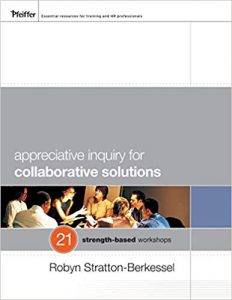
Robin Stratton-Berkessel wrote this book for educators, facilitators, leaders, professionals, and consultants who want to expand their Appreciative Inquiry skills and toolbox. It contains the application of the AI method in workshop and training design.
The format is intended to be a real life, hands-on, practical way to use AI techniques. It includes 21 practical AI workshops ready for delivery. The workshops have various applications in schools, communities, organizations, universities, etc.
The purpose of the workshops is to facilitate a more strengths-based cultural shift. The author’s intention is to accelerate greater conscious awareness and encourage collaborative mindsets, which can subsequently improve performance.
There are various workshop modules presented. Each theme starts with an AI framework: “What is it that we are doing already that is working for us, and how can we leverage our strengths moving forward?” Participants develop an understanding of each topic, generate ideas and proposals to take action moving forward.
The workshop models provide a framework for facilitators to guide and engage groups to identify meaningful and sustainable solutions. The workshops provide meaningful reflection and insight to be gained in less than half a day.
Topics of the deliverable workshops include: leadership, technology, diversity, creativity, change, innovation, collaboration, learning, coaching, and team building. Author Stratton-Berkessel also suggests how to make the outcomes of these AI workshops stick and become self-sustaining.
You can find Appreciative Inquiry for Collaborative Solutions on Amazon.
8. A More Beautiful Question
Journalist Warren Berger explores the art and science of questioning. In this book, he considers the critical role questioning plays in empowering people to innovate, solve problems, and move forward in their lives and careers.
In studying some of the world’s leading innovators, engineers, and problem-solving, he discovered a common pattern in their ability to ask powerful questions.
Despite the power of insightful questioning, Berger discovered that few organizations or schools are actually structured to support and encourage this process. While powerful questions have been the foundation of scientific research, Berger believes it is a skill underdeveloped and under taught.
He asks the insightful question of – if we know it is beneficial, leads to innovation, and contributes to measurable results, why don’t we use this method more? One potential reason is that it disrupts the status quo, processes, structures, standards that are already in place, so to do so, some control needs to be given up.
In the book, this innovation expert proposes that the right questions asked at the right time can ignite personal and organizational change. Although the most creative, successful people are considered expert question askers, it is still under-used in our daily lives.
In his research, he notes that children start out with such curiosity, asking questions daily to understand the world around them. Over time, in business and educational settings, too much questioning can be discouraged and even not tolerated.
Berger shares inspiring real-life stories of organizational cultures and individuals who inspired change by starting with a “beautiful question.”
You can find A More Beautiful Question: The Power of Inquiry to Spark Breakthrough Ideas on Amazon.
9. Appreciative Inquiry: A Positive Approach to Building Cooperative Capacity
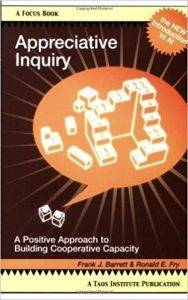
This book was written by AI SME’s Frank Barrett and Ronald Fry as an introduction to and an overview of Appreciative Inquiry as an approach to increasing organizational capacity. Authors propose relationships come alive through the Appreciative Inquiry process.
This book is about the power of AI as a method of creating relational space for the cooperative construction of reality. A key component is that, according to the authors, the questions we ask determine whether we eventually diminish our capacity to grow and develop, or increase it.
They highlight how learning always begins with a question, a moment of inquiry. Authors propose the way these questions are formed can have a great impact on results. The book supports the position that framing questions with a positive stance and focusing on topics that promote organizational learning will, therefore, contribute to increased cooperative capacity.
This book provides a useful distinction in the contrast between deficit learning and an appreciative approach. Authors provide an interesting metaphorical example of Michelangelo’s approach to creating the statue of David, in that he was focused on creating a positive image of what he desired vs. focusing on what he wanted to avoid.
You can purchase Appreciative Inquiry: A Positive Approach to Cooperative Capacity on Amazon.
10. Stan and the Four Fantastic Powers
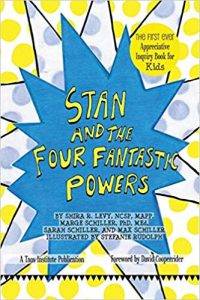
A unique offering, “Stan and the Four Fantastic Powers” was written by a team of inter-generational collaborators: an AI expert and grandmother (Marge Schiller), in collaboration with her two grandchildren (Sarah and Max Schiller), a school psychologist and positive psychology practitioner (Shira Levy), and an artist (Stefanie Rudolph) to share the concepts and practice of Appreciative Inquiry with children.
The concepts of AI including positive questioning, collaboration, curiosity, and creativity, come to life in this book. It is a story of how Stan, Mr. Gladstone’s class, and Lincoln Elementary School discover a new way of looking at things and how they become change agents. Their focus is on strengths, imagination, teamwork, and goal setting.
Through the story, they identify their own powers to bring the community together and help create the future of the school’s playground.
The AI 4-D cycle is represented through Stan’s Four Fantastic Powers:
- ME Power: discovering strengths
- SEE Power: dreaming of future possibilities
- WE Power: working as a team to develop goals and a plan
- DO Power: delivering the plan
You can purchase Stan and the Four Fantastic Powers on Amazon.
11. Essentials of Appreciative Inquiry
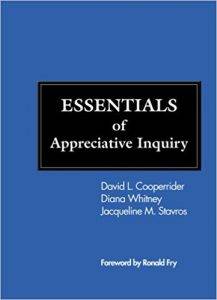
This book consists of the first seven chapters of the Appreciative Inquiry Handbook, by Cooperrider, Whitney, and Stavros.
It is a shortened version of the book targeting workshop leaders, students and those in academia.
It provides the theoretical background and core components of the AI process.
It also includes six mini-lectures that serve as supplementary support materials.
You can purchase the Essentials of Appreciative Inquiry on Amazon.
12. Appreciative Living: The Principles of Appreciative Inquiry in Personal Life
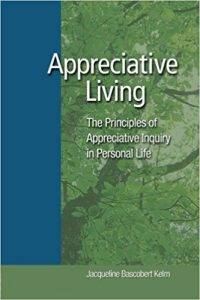
Jacqueline Bascobert Kelm wrote this book intending to help others find the joy in living that is available to all of us. Her focus is on applying the AI principles on a personal level, “being it” in your life rather than just “doing it.”
She wrote the book for audiences who have familiarity with AI as well as individuals who are new to the Appreciative Inquiry model.
It provides theoretical grounding of the AI model and describes how we create our personal realities. The nature of our underlying beliefs and assumptions is explored, as well as how they impact our present and future.
The author provides support for the power of shifting our thoughts and patterns of behavior to the positive and appreciating the best in ourselves and others.
The book provides a balance of theoretical and philosophical context behind AI, as well as more practical applications.
She provides a clear three-step process of how to apply AI to our daily lives in a way that will lead to positive growth. At the end of the book, a resource summary is provided in bullet format, creating a brief synopsis of the concepts.
You can purchase Appreciative Living: The Principles of Appreciative Inquiry in Personal Life on Amazon.
13. Appreciative Inquiry in Higher Education: A Transformative Force
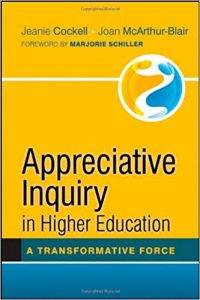
This book shares the experiences and stories of two lifetime educators, Jeanie Cockell and Joan McArthur-Blair, who have committed to integrating Appreciative Inquiry with higher education.
The book was created to be a thought-provoking piece with practical relevance. Authors suggest a need to re-examine the pillars of how our higher education model was constructed.
Considering that higher education is where learning and innovation occur, they propose that this model be built on Appreciative Inquiry and provide how to use AI for transformational change in education.
Given the current state of change in higher-level education, the authors propose this is a key to leverage AI concepts during this transition.
You can purchase Appreciative Inquiry in Higher Education: A Transformative Force on Amazon.
14. Dynamic Relationships: Unleashing the Power of Appreciative Inquiry in Daily Living
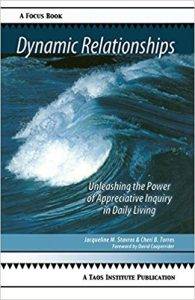
In this book, well-regarded AI leaders, Jackie Stavros, and Cheri Torres recognize that the dynamics of our relationships and the significance of our actions and living with appreciative inquiry are key.
As part of a focus book series, this book is based on the idea of how important it is for us to focus on “how we are in relation with one another.” It describes the appreciative paradigm in daily living. The content is focused on individuals-in-relationships-with-others and provides an opportunity to look inside personal relationships as significant to social construction.
Authors highlight how creating positive dynamics and sustained success requires continuous awareness and informed, appreciative action. It provides an applied section allowing readers to develop thoughts, actions, and patterns to support positive relationships.
Readers are given the opportunity to practice these AI principles through cycles of reflection and action to sustain life-affirming relationships.
You can purchase Dynamic Relationships-Unleashing Appreciative Inquiry on Amazon.
15. Appreciative Inquiry: Research for Change
In Appreciative Inquiry, Research for Change, Jan Reed explores the issues that come up when AI is used as a research framework rather than an organizational development tool or model.
She describes using AI as a research method, specifically in terms of how to frame questions, gather information, and communicate ideas.
This book is denser and applicable to researchers who wish to integrate AI concepts into a scientific methodology.
You can purchase Appreciative Inquiry: Research for Change on Amazon.
A Take-Home Message
Whether you are an expert or a curious student of AI, we hope this summary was useful. Our intention was to summarize AI key concepts and various ways to apply it.
There is rich material out there highlighting the applications of AI in coaching, individuals, organizations, teams, communities, etc. The potential impact of AI is infinite, and we hope this article sparked your interest.
If you have favorite Appreciative Inquiry resources, please share in the comments. As always, we welcome your ideas and input.
We hope you enjoyed reading this article. Don’t forget to download our three Strengths Exercises for free.
- Barrett, F.J. & Fry, R.E. (2005). Appreciative Inquiry: A Positive Approach to Cooperative Capacity.
- Bascobert Kelm, J. (2010). Appreciative Living: The Principles of Appreciative Inquiry in Personal Life.
- Berger, W. (2016). You can find A More Beautiful Question: The Power of Inquiry to Spark Breakthrough Ideas.
- Cockell, J. & McArthur-Blair, J. (2012) Appreciative Inquiry in Higher Education: A Transformative Force.
- Cooperrider, D. & Whitney, D. (2005). Appreciative Inquiry: A Positive Revolution in Change.
- Cooperrider, D. & Diana Whitney, D. (2008). Appreciative Inquiry Handbook: For Leaders of Change.
- Hammond, Sue Hannis (2016). You can purchase the Thin Book of Appreciative Inquiry 3rd Edition.
- Levy, S., Schiller, S., Schiller, S., & Max Schiller, M (2018). Stan and the Four Fantastic Powers.
- Lewis, S., Jonathan Passmore, J., & Stefan Cantore, S. (2011). Appreciative Inquiry for Change Management: Using AI to Facilitate Organizational Development.
- May, N., Becker, D., Frankel, R., Haizlip, J., Harmon, R., Plews-Ogan, M., J. Schorling, J., Williams, A. & Whitney, D. (2011). Appreciative Inquiry in Health Care: Positive Questions to Bring Out the Best.
- Reed, J. (2007). Appreciative Inquiry: Research for Change (2007).
- Stavros, J. and Torres, C. (2005). Dynamic Relationships-Unleashing Appreciative Inquiry.
- Stratton-Berkessel, R. (2010). Appreciative Inquiry for Collaborative Solutions.
- Watkins, J. M., Mohr, B. & Ralph Kelly (2011). Appreciative Inquiry: Change at the Speed of Imagination.
Read other articles by their category
- Body & Brain (41)
- Coaching & Application (49)
- Compassion (27)
- Counseling (46)
- Emotional Intelligence (23)
- Gratitude (16)
- Grief & Bereavement (19)
- Happiness & SWB (35)
- Meaning & Values (26)
- Meditation (21)
- Mindfulness (42)
- Motivation & Goals (42)
- Optimism & Mindset (33)
- Positive CBT (24)
- Positive Communication (21)
- Positive Education (41)
- Positive Emotions (28)
- Positive Psychology (33)
- Positive Workplace (38)
- Relationships (31)
- Resilience & Coping (33)
- Self Awareness (21)
- Self Esteem (38)
- Software & Apps (23)
- Strengths & Virtues (28)
- Stress & Burnout Prevention (27)
- Theory & Books (42)
- Therapy Exercises (30)
- Types of Therapy (53)
